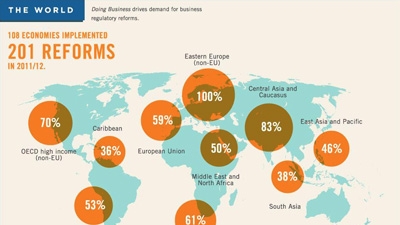![]()
Washington, D.C., October 23, 2012—A new IFC and World Bank report finds that since 2005, the Eastern Europe and Central Asia region leads the world in enhancing the business climate for local firms. The region overtook East Asia and the Pacific to become the world’s second most business-friendly, after OECD high-income economies.
Released today, Doing Business 2013: Smarter Regulations for Small and Medium-Size Enterprises finds Poland was the top global improver in the past year. It enhanced the ease of doing business through four institutional and regulatory reforms, making it easier to register property, pay taxes, enforce contracts, and resolve insolvency. Economies in Europe and Central Asia have implemented nearly 400 institutional and regulatory reforms since 2005, more than any other region in the world.
“We are very encouraged by the rapid pace of reform in Eastern Europe and Central Asia,” said Augusto Lopez-Claros, Director, Global Indicators and Analysis, World Bank Group. “Many of these reforms have been implemented in the context of EU accession negotiations. Economic integration and the desire to catch up with more prosperous partners have been a powerful incentives to promote ambitious reform agendas.”
The report shows Georgia joining the top 10 economies in the global ease of doing business ranking. Georgia is also the world’s top improver since 2005. With 35 institutional and regulatory reforms since then, Georgia has improved in all areas measured by Doing Business. In the past year alone it improved in six areas, more than any other economy in the world.
Georgia, ranked ninth overall in the 2013 report, made enforcing contracts easier by simplifying and speeding up the proceedings for commercial disputes. It strengthened its secured transactions system through an amendment to the civil code allowing a security interest to extend to the products, proceeds, and replacements of collateral. It made getting electricity easier by simplifying the process of connecting new customers to the distribution network and reducing connection fees. It made paying taxes easier for companies by enhancing the use of electronic systems and providing more services to taxpayers. In addition, Georgia expedited the process of resolving insolvency by establishing or tightening time limits for all insolvency-related procedures, including auctions. Finally, it reduced the time to export and import by creating customs clearance zones.
Globally, Singapore retains its number one slot in the global ranking on the ease of doing business for the seventh consecutive year. Joining it on the list of the 10 economies with the most business-friendly regulations are Hong Kong SAR, China; New Zealand; the United States; Denmark; Norway; the United Kingdom; the Republic of Korea; Georgia; and Australia.
A case study in this year’s report features Latvia, highlighting the country’s regulatory reform agenda and achievements in the areas measured by Doing Business.
About the Doing Business report series
Doing Business analyzes regulations that apply to an economy’s businesses during their life cycle, including start-up and operations, trading across borders, paying taxes, and protecting investors. The aggregate ease of doing business rankings are based on 10 indicators and cover 185 economies. Doing Business does not measure all aspects of the business environment that matter to firms and investors. For example, it does not measure the quality of fiscal management, other aspects of macroeconomic stability, the level of skills in the labor force, or the resilience of financial systems. Its findings have stimulated policy debates worldwide and enabled a growing body of research on how firm-level regulation relates to economic outcomes across economies. This year’s report marks the 10th edition of the global Doing Business report series. For more information about the Doing Business report series, please visit www.doingbusiness.org. Join us on Facebook.
About the World Bank Group
The World Bank Group is one of the world’s largest sources of funding and knowledge for developing countries. It comprises five closely associated institutions: the International Bank for Reconstruction and Development (IBRD) and the International Development Association (IDA), which together form the World Bank; the International Finance Corporation (IFC); the Multilateral Investment Guarantee Agency (MIGA); and the International Centre for Settlement of Investment Disputes (ICSID). Each institution plays a distinct role in the mission to fight poverty and improve living standards for people in the developing world. For more information, please visit www.worldbank.org, www.miga.org, and www.ifc.org.
Regional Media Contacts:
Central and Eastern Europe
Ilya Sverdlov, IFC
Phone: +7 (495) 411-7555
E-mail: ISverdlov@ifc.org
Nezhdana Bukova , IFC
Phone: +7 (985) 411-3986
E-mail: NBukova@ifc.org
Southern Europe
Slobodan Brkic, IFC
Phone: +381 (11) 30-23-750
E-mail: SBrkic@ifc.org
Kristyn Schrader-King, World Bank
Phone: +1 (202) 458-2736
E-mail: kschrader@worldbank.org

